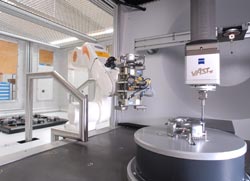A Powerful Team: GageMax from Carl Zeiss and Robots

Suitable for integration into the automated flow of production and materials: GageMax from Carl Zeiss.<br>
Thanks to defined interfaces, these modules facilitate the fast and easy connection to peripheral devices and thus integration into the automated flow of production and materials.
Robotics and inline measuring technology together create the potential for zero-defect production with foreseeable costs. With the joint benefits of flexibility and adaptability, an intelligent combination of robot and coordinate measuring technology provides the necessary symbiosis to react to shorter product and innovation cycles, as well as the increased variety of models in modern production environments.
The inline-capable coordinate measuring machines from Carl Zeiss, GageMax® for example, offer the ideal foundation for process integration. Resistant to temperature fluctuations, robust, vibration-absorbent and highly dynamic, these measuring machines provide the foundation for the flexible capture of measurement data in highly automated production environments.
Accessible from three sides, the lowered table on GageMax permits fast pallet feeding and automated loading/unloading with a robot. This increases the integration possibilities of GageMax in interlinked production systems. Furthermore, VAST® technology turns GageMax into a very fast, highly efficient scanning system that seamlessly fits directly into production without taking up a lot of space.
Media Contact
More Information:
http://www.zeiss.com/imtAll latest news from the category: Corporate News
Newest articles

Sea slugs inspire highly stretchable biomedical sensor
USC Viterbi School of Engineering researcher Hangbo Zhao presents findings on highly stretchable and customizable microneedles for application in fields including neuroscience, tissue engineering, and wearable bioelectronics. The revolution in…

Twisting and binding matter waves with photons in a cavity
Precisely measuring the energy states of individual atoms has been a historical challenge for physicists due to atomic recoil. When an atom interacts with a photon, the atom “recoils” in…

Nanotubes, nanoparticles, and antibodies detect tiny amounts of fentanyl
New sensor is six orders of magnitude more sensitive than the next best thing. A research team at Pitt led by Alexander Star, a chemistry professor in the Kenneth P. Dietrich…





















